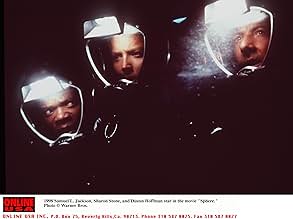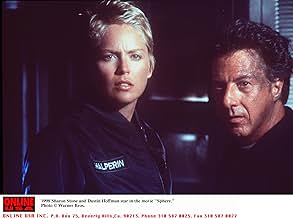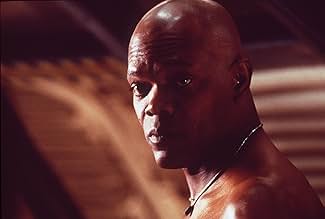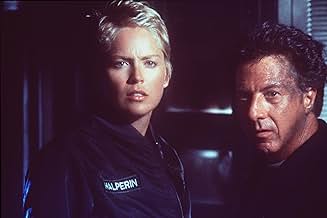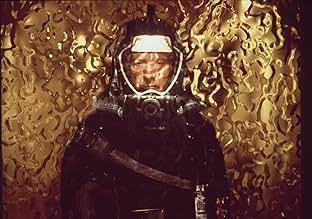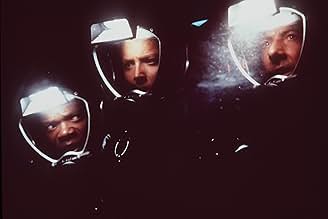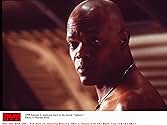Ein Forschungsteam untersucht ein abgestürztes Raumschiff auf dem Grund des Ozeans.Ein Forschungsteam untersucht ein abgestürztes Raumschiff auf dem Grund des Ozeans.Ein Forschungsteam untersucht ein abgestürztes Raumschiff auf dem Grund des Ozeans.
- Auszeichnungen
- 3 Nominierungen insgesamt
Empfohlene Bewertungen
The movie follows the book pretty closely. Barry Levinson directs his 2nd Crichton adaptation, following Disclosure. There is a terrific superstar cast. Dustin Hoffman is a legend and has made several great movies with Levinson. Samuel L. Jackson, always fun to watch, is one of the top actors of today. The sexy Sharon Stone here continues to prove how good of an actress she is.
Sphere is a very strange, but entertaining movie. I do reccomend reading the book beforehand, though.
The government has discovered a space craft buried beneath some coral in the Pacific Ocean. The government concludes that this must be an opportunity at alien contact so they grab a team of scientists to make the first contact. Within the crashed vessel they find a shimmering sphere. A few of the scientist decide to enter it and then things get weird.
I liked the cast: Sharon Stone, Samuel L. Jackson, Dustin Hoffman, Liev Schrieber, Queen Latifah et al. The setting was very claustrophobic as they spent the majority of the movie 1000 feet beneath the surface surrounded by water. Once people started being killed by odd creatures it was race to figure out what or who was causing this before they all perished.
This movie was really about man's inability to handle alien gifts/technology. That's a lesson we've learned many times over. The movie got a bit confusing towards the end as they tried to solve the mystery of who/what was the cause of the death and destruction. I felt there were a lot of holes in the movie and it left me a bit unfulfilled.
Rotten Tomatoes gives the film a score of 12% based on 50 reviews, with the critical consensus that "Sphere features an A-level cast working with B-grade material, with a story seen previously in superior science-fiction films." Indeed, one wonders what Sharon Stone and Dustin Hoffman were doing in this. Hoffman, of course, was brought on by the director, his friend Barry Levinson. But Stone should have had better projects.
Some aspects of this are interesting, and even though it was a flop at the time, I could see people today (2015) going back and really giving it a second chance. It has not become a better film with age, but it has something to say about science fiction films of the 1990s. (Most, it seems, were dystopian, so this is something of a fresh change.)
Barry Levinson is one of those directors who has no interest in art, or in invention, or in pretension, either. And so his films sometimes hit a popular strain that makes them take off. He has some terrible misfires, for sure, but his best films ("Rain Man," "Sleepers") have people who you relate to, and who have to confront something extraordinary.
That was the idea here, based on a Michael Crichton novel (that should have been a heads up). The cast is headliner stuff. Dustin Hoffman is particularly convincing, Samuel Jackson plays a great type, and Liev Schreiber is sharp. Sharon Stone is a dull fourth. They bond, and realize they have things in common, in the first minutes of the film as they converge and go under water to check out an alien spaceship. Even after they are deep below the surface and beginning their unlikely exploration they make a viewer connect. As much as it borrows from "Alien" and "Aliens" this could have been a good film on its own terms. Even the talking computer/alien has its own edge compared to HAL.
What goes wrong is the plot itself, and not acting, or even directing, can overcome that. As it gets hairier, we need it to be more plausible, not less. Events get increasingly chaotic, so that action and loud noise drive some of the scenes. Subplots are continued but seem increasingly meaningless (at one point, Hoffman and Stone are rushing into the water in an absolute emergency and they start to chitchat about their distant failed love affair). And finally, as people die off and the menace becomes more ambiguous, the movie becomes completely ambiguous, and as a kind of escape valve, announces that any number of crazy thing we have been watching may or may not have been imagined by one character or another.
But what does that mean about the camera? Isn't there still a differentiation between cinema reality and one character's delusion? Or if these are global delusions including the viewer, shouldn't they do more than simply disorient us? Well, don't hang on for answers. Just hang on. An explosion (of course) caps it all off (why they didn't hit the disarm button isn't explained), and a final logical wrap up that avoids the time travel paradox is warm and fuzzy.
Wusstest du schon
- WissenswertesMany scenes, like Harry (Samuel L. Jackson) and Norman's (Dustin Hoffman's) conversation about making up the ULF report and dealing with Ted (Liev Schreiber), were completely improvised.
- PatzerWhen Jerry first makes contact, he transmits in code : "MY NAME IS JERRY". Later, the code is revealed to have been mistranslated and the message reads: "MY NAME IS HARRY" If the letters H, E, J, and A in the simple letter/number substitution code were wrong, the first message would have read: "MY NEMA IS JERRY". Also, the entire series of conversations they had would have exhibited the same error, yet none did so. (HAPPY would have been JEPPY, ALL = ELL, etc.)
- Zitate
Dr. Harry Adams: We're all gonna die down here.
Norman Goodman: What?
Dr. Harry Adams: You see? It's curious. Ted did figure it out - time travel. And when we get back, we gonna tell everyone. How it's possible, how it's done, what the dangers are. But then why fifty years in the future when the spacecraft encounters a black hole does the computer call it an 'unknown entry event'? Why don't they know? If they don't know, that means we never told anyone. And if we never told anyone it means we never made it back. Hence we die down here. Just as a matter of deductive logic.
- Crazy CreditsThe opening credits are cast over an invisible sphere.
- Alternative VersionenSPOILER ALERT: An alternate television edit has been shown with a simplified and more ambiguous ending that follows the shooting script; Harry warns them that the authorities are on their way to debrief them, and they will demand answers. The three survivors ready themselves to forget about their mission and the power they possess. Outside, a helicopter sets down. Subsequently, we see the three survivors being interviewed in a debriefing room after decompression, each shot individually against the same background. They react as if they're oblivious to anything going wrong in the Habitat, unaware of anything that happened to Ted, Barnes or the Sphere. The helicopter leaves, and the camera pans down to the ocean, where the Sphere supposedly still remains.
- SoundtracksHorn Concerto No. 3 in E Flat Major, K.447
Written by Wolfgang Amadeus Mozart
Performed by Vienna Mozart Ensemble; Herbert Kraus, Conductor
Courtesy of LaserLight Digital
By arrangement with Source/Q
Top-Auswahl
- How long is Sphere?Powered by Alexa
- How many chapters does the film have and what are their names?
Details
Box Office
- Budget
- 80.000.000 $ (geschätzt)
- Bruttoertrag in den USA und Kanada
- 37.020.277 $
- Eröffnungswochenende in den USA und in Kanada
- 14.433.957 $
- 15. Feb. 1998
- Weltweiter Bruttoertrag
- 37.020.277 $
- Laufzeit2 Stunden 14 Minuten
- Farbe
- Sound-Mix
- Seitenverhältnis
- 2.39 : 1
Zu dieser Seite beitragen



